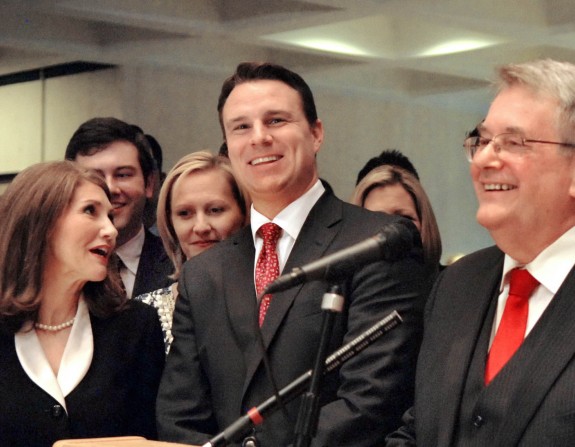
Florida House Speaker Will Weatherford and other House Republicans kept their insurance premiums low while denying Medicaid to low-income Floridians. (Photo courtesy of the Florida Legislature.)
By Ashley Lopez
Florida Center for Investigative Reporting
At the same time the Republican-led Florida Legislature was turning down federal funds that would pay for expanding the state’s Medicaid program to more than 1 million people who cannot afford health insurance, those same state lawmakers were working to keep their own insurance premiums lower than most other state employees.
According to Tia Mitchell of The Tampa Bay Times/Miami Herald:
House members will pay just $8.34 a month for state-subsidized health care next year, or $30 a month to cover their entire family.
That’s one-sixth of what state senators and most state employees will pay, and one-tenth of the cost to the average private-sector worker, according to the Kaiser Family Foundation.
It’s also less than the $25 a month House Republicans wanted to charge poor Floridians for basic coverage such as a limited number of doctor visits or preventive care.
House Republicans, including Speaker Will Weatherford, R-Wesley Chapel, would not say why the House did not raise its premiums to match the Senate. The premium increase was also part of Gov. Rick Scott’s proposed budget.
In a statement Monday, Weatherford said: “We are aware of the differences in what House members pay compared to other state employees for health insurance and are looking forward to addressing it next session.”
The Times asked three members of the Pinellas County delegation about the discrepancy this week. Reps. Larry Ahern, Ed Hooper and Kathleen Peters, who voted against Medicaid expansion, defended their state-subsidized health insurance premiums — but said they would be willing to pay more if the issue was addressed by the Legislature:
“I don’t mind paying more for that insurance,” Ahern told aTimes reporter after the 90-minute luncheon at the St. Petersburg Marriott Clearwater Hotel …
Ahern and Hooper, R-Clearwater, pointed to the national debt, saying Florida could not rely on the federal government. Peters, R-South Pasadena, stressed she voted against the Medicaid expansion alternative because there was never a focus on how it would work, not because of the federal money.
As far as her own health insurance, Peters noted that House members only make about $29,000 a year. Still, she said their low premiums are “not fair and equitable” compared with what state workers and others pay for health insurance.
Members of the Florida Senate proposed a plan that was endorsed by both Republicans and Democrats in the Legislature. The plan would have accepted the millions in federal funds, but would have directed the money through a state program to buy private insurance for those Floridians who qualified.
However, the more conservative members of the Florida House were opposed to accepting any federal money allocated through the health care law. Florida House Speaker Will Weatherford, R-Wesley Chapel, was among them.
Weatherford has been staunchly opposed to expanding Medicaid in the state, even though Gov. Rick Scott has said he supported the expansion.
Health experts warn that not moving on Medicaid expansion will hurt the state’s businesses and hospitals.
WUSF’s Health News Florida reports:
Florida corporations have been “too quiet” about Medicaid expansion and other health care issues, and should make elected officials aware of their displeasure before the damage gets worse, said William Kramer, a national health policy leader in San Francisco who works with corporations.
“If Medicaid is not expanded, it’s going to raise the premiums employers pay for health coverage, because hospitals will raise the costs they charge,” Kramer said. “Businesses have to speak up. They don’t have to do it in a political way, they just have to say it’s bad for business. It’s bad for employees, too, because the more money that goes for health benefits, the less that is available for wages.”
Regardless, the Florida Senate and House would have to reach a basic agreement before Scott can call a special session to vote on a plan.
